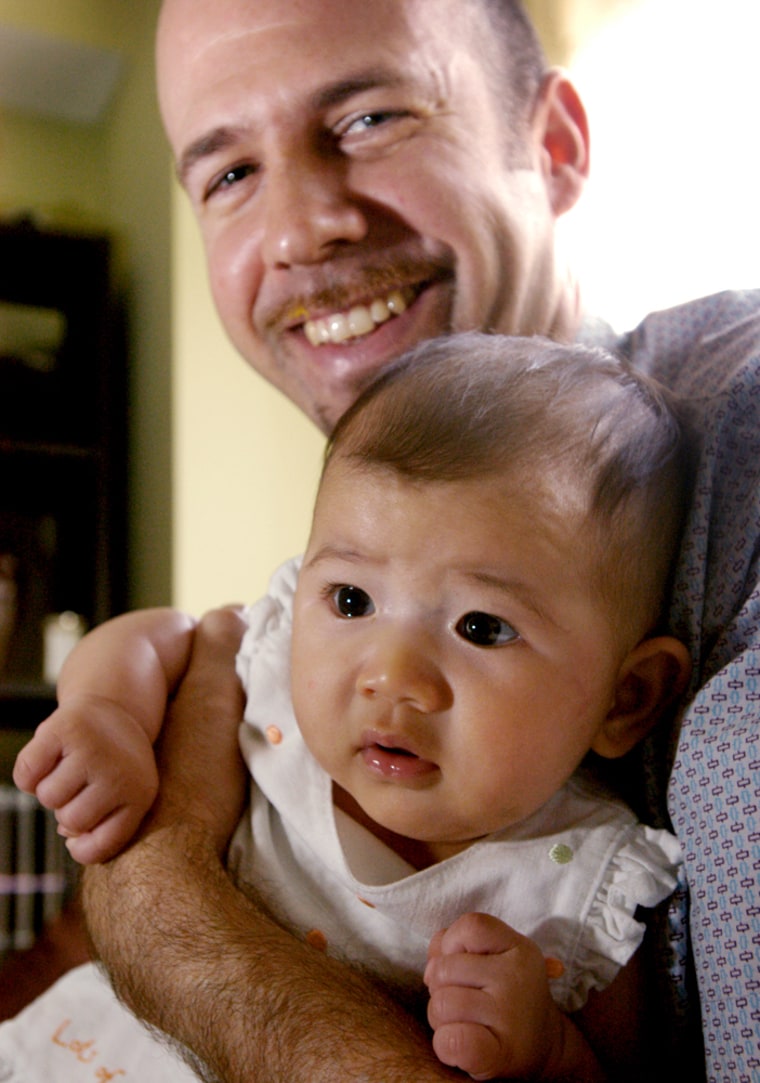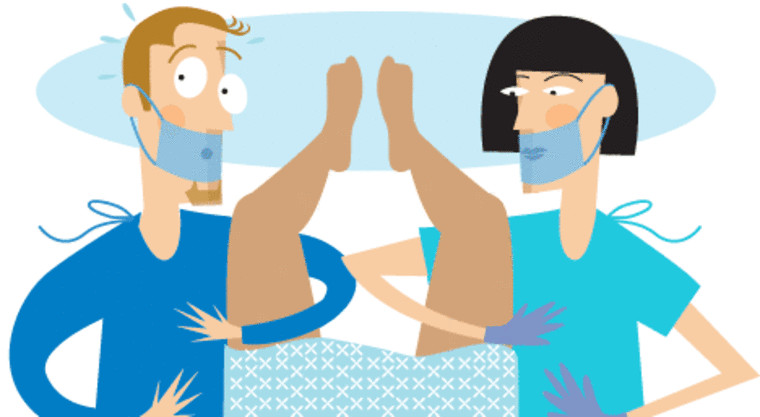Looking back I can't say that my wife, Emily, and I were expecting a scene from a Doris Day movie when we toured the birthing ward of our hospital two weeks before our due date. But we certainly weren't expecting "Full Metal Jacket" either.
On that day in late February, St. Vincent’s Hospital in New York City was Baby Factory U.S.A.
Again and again double doors flew open to reveal a new family. The scene was always the same — an exhausted mama, bundled baby, and lagging far behind, the bleary-eyed papa. They passed with their thousand-yard stares with not a glance at our touring group of fresh-faced parents-to-be.
This didn't look good.
At this point, Emily was due to deliver our first child within two weeks. And like the majority of first-time dads I was in the throes of delivery-room anxiety, which included a fear of fainting in what I imagined to be a sea of bodily fluids.
This selfish anxiety paled in comparison to what Emily would face in the delivery room. But my fears had already evolved into an imaginary scenario I could not get out of my head: Me fainting and having my pathetic self wheeled out of the delivery room as I try to whisper "sorry" through the oxygen mask — all of which would be followed by my eternal humiliation.
I took comfort in the understanding that I wasn't alone. Generations of American men have faced my anxiety and shared my ignorance and lived.
When guys talk about childbirth, which is rare, they describe it as an ordeal, a possibly gooey trial that must be endured. As the days ticked by I sought out these veterans — who were easy to identify at social gatherings by their bloodshot eyes.
“Make sure you’re up by her head," they'd say. "You do not want to look down.”

And then would follow a long, detailed description of what to expect. I learned that the placenta looked like the biggest, rarest steak imaginable.
Books were suggested. One friend, a new father, thrust a book called “The Birth Partner” in my hands. I flipped to a chapter detailing what to do when your baby dies. Jeesh. No thanks.
Then I thumbed through several well-worn birthing books, but it was hard to study diagrams of labor positions when the daddies illustrated looked like they just walked off Rajneesh's commune.
For me, the books only highlighted what I perceived to be my uselessness. It was Emily who was pregnant, who lugged herself with 35 extra pounds down city streets to work, and who looked at me with envy when I ordered a second beer.
Breathe deeply, daddy
Two weeks to the day of our hospital tour Emily started experiencing light, but regular contractions. I met her that evening outside her office. She was surrounded by a half-dozen female co-workers offering their good wishes and telling me to take care of their friend.
I felt more prepared. I had managed to thumb through all the color photographs of a conception-to-birth book, feeling nauseated most of the way.
At 3 a.m. the next morning, after hours of holding Emily's hand and counting down the elapsed time of stronger contractions, I faced my first big daddy task — the hailing of the taxi. I set Emily down in the lobby of our building and ran out into the street, arms flailing, to grab one.
Shortly after arrival at the hospital, a resident stopped by to see if Emily, now in a gown and attached to a fetal monitor, would like a little Demerol.
But Emily had previously decided that she would get an epidural when the pain became too much. Demerol sounded like something that housewives on "Peyton Place" knocked back with martinis.
"No Demerol,” I replied. The resident left.
Shortly after sunrise the morning shift nurse breezed into the room. She opened the curtains, provided drinks, fluffed up the pillows and made Emily feel like an expectant mother and not just a number awaiting a medical procedure.
As the pain of Emily’s contractions increased and the fetal monitor printout started to take on the peaks of an 8.0 earthquake, I realized that for all my hand-holding and words of assurance, nothing or no one provided as much support and comfort as our nurse.
PUSH!
"What do you say we get ready to push?” asked our obstetrician.
Personable and energetic, she was not the stereotypical doctor that I imagined would be handling our delivery. She exuded confidence and a friendly bedside manner, and managed to set us all at ease.
But the suggestion to push brought my anxieties back.
Pushing? Could I get a couple minutes to gather my thoughts? A moment perhaps to say goodbye to our old life? How about some coffee?
"Take a leg,” the nurse instructed as she hoisted Emily's other leg over her own shoulder.
We fell into a routine: Emily would announce when a contraction was coming. The nurse and I would count aloud from one to 10. Emily would push hard for those 10 seconds and then repeat this two more times during each contraction. Between contractions I would attempt a lame joke.
We were all cheerleaders. C’mon Emily, you can do it! C’mon honey! I felt like I had tapped into the mystical “girl power” that the Spice Girls sang about back in the 1990’s. If someone was passing out sparkly lip gloss, I would have applied it. The estrogen rah-rahs were flowing.
Around 10 minutes into the pushing I caught a glimpse of a tuft of baby hair. OK ... breathe deeply. It’s not gross. It’s your daughter.
This was the "ah-ha, so this is what it's like" moment.
Fear of the actual birth and all its accompanying bodily fluids became trivial. More knee-shaking was the realization that the little creature that we had lived with, talked to and felt kick over the months was real and only moments from making her appearance.
Emily didn’t have time for the existential realization. She was too busy pushing or resting. So the moment was mine and I imagine one shared by delivery-room daddies everywhere.
After 45 minutes of pushing, the head emerged. The doctor turned it back and forth gently to pry the baby from the birth canal. Seconds later the shoulders were out, followed by the rest of her body.
The most beautiful sound in the world
Nora gave a good little cry as she was placed on Emily's tummy. It was the most beautiful sound in the world. I let my girls have their time.
Nora went from a pinkish-blue to pink. Her nose was flattened like a little boxer fresh out of the ring. Eyes brown. Tufts of dark brown hair on her head (already she had more hair than her old man).
Ten minutes passed. "Alright daddy, your turn,” our nurse said. She scooped Nora off of Emily’s chest and handed the little squirmer to me.
Unbeknownst to me as I sat in the corner basking in Nora's gaze, complications were developing with Emily. The placenta would not come out. When I finally looked up, the nurse was looking at her watch, counting out the minutes until Emily would need to be wheeled to surgery.
The doctor bent over Emily. Her gloves were bloody, which seemed odd since the birth was relatively blood-free.
"I’m not going to be your best friend," the doctor said. "This is really going to hurt.” She reached in and pulled the placenta out.
Emily later said it was the worst pain she ever felt. I didn’t tell her that it was the most helpless I ever felt. Over the last several hours I had served as hand-holder, fetcher of ice chips and teller of bad jokes. But the real work was handled by the pros.
In an hour Emily was placed in a wheelchair for her quick journey to the postpartum ward. I gave the nurse a hug, thanking her.
The double doors opened up. Emily and the nurse led the way. I followed with Nora all swaddled up and looking cozy and happy.
Did I smile or did I have the same thousand-yard stare of those daddies I saw two weeks ago? I’m not sure. But I never felt so happy.
